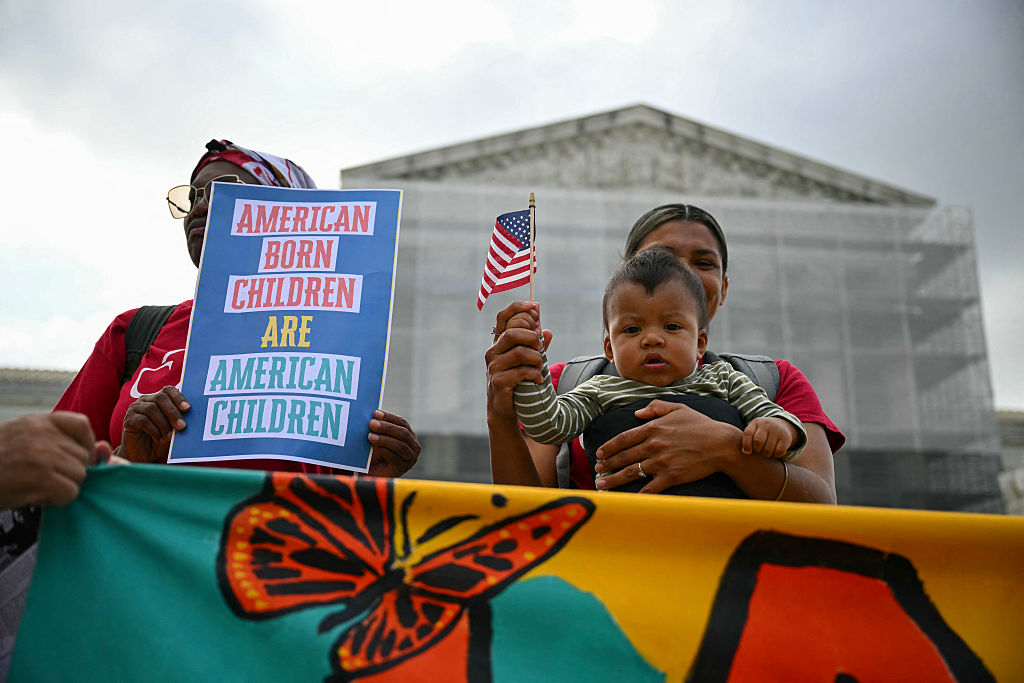The Justices on the Supreme Court wrestled on Thursday with a high-stakes case involving birthright citizenship that’s poised to shape both the Trump Administration’s immigration policy and its attempts to expand presidential power.
At issue was an executive order from President Donald Trump that asserted that the longstanding constitutional right of birthright citizenship no longer applied to babies born to parents that lack U.S. citizenship or lawful permanent residency. Oral arguments on Thursday were focused on the Administration’s attempts to undo nationwide injunctions from lower courts, which have stopped the policy from being enacted while the Administration fights litigation against it.
[time-brightcove not-tgx=”true”]
Solicitor General D. John Sauer argued on behalf of the Trump Administration that nationwide injunctions—which he called “universal injunctions”—are unconstitutional and that the lower counts should have only been able to block Trump’s order in relation to those who had filed lawsuits. Sauer said only the Supreme Court could rule on the constitutionality of the executive order for the entire country.
Justice Sonya Sotomayor was among the Justices to push back most strongly against the Administration’s position, arguing that allowing an executive order as wide-reaching as Trump’s order on birthright citizenship to go into effect for parts of the country but not others was unreasonable, as was waiting for the Supreme Court to resolve such issues. She posited the hypothetical of a president concerned with gun violence who goes and “seizes everyone’s guns.” She challenged Sauer’s contention that “we and the courts have to sit back and wait until every claim in every case” has been resolved before such an order could be undone.
Multiple courts have found the executive order is in violation of the doctrine of birthright citizenship guaranteed under the 14th Amendment, as well as more than 120 years of court precedent set by the Supreme Court in the landmark 1898 ruling United States v. Wong Kim Ark. Sotomayor said during the arguments that Trump’s order, at her count, violates four Supreme Court precedents.
Though Trump’s immigration policy is at the center of the case, the court may ultimately rule only on the issue of how federal courts are able to limit executive power through nationwide injunctions. Such a decision is likely to have far-reaching implications for Trump’s presidency, as he pushes to expand executive power and the courts try to make sense of that.
Multiple Justices argued against the feasibility of ending nationwide injunctions. Justice Elena Kagan offered a hypothetical in which the government keeps losing at the lower courts on individual cases. Why, she asked, would an Administration ever appeal to the Supreme Court and risk a ruling against them, if they no longer have to worry about nationwide injunctions?
At the same time, conservative Justices gave Sauer some refuge. Justice Clarence Thomas argued that the country “survived until the 1960s without universal injunctions.” Justice Brett Kavanaugh said that there were times that the Supreme Court had been able to move quickly on high-profile, high-consequence cases, pointing to the TikTok case the Supreme Court took up in a matter of weeks earlier this year.
Though the Court mostly focused on nationwide injunctions, the Justices did touch on the constitutionality of Trump’s birthright citizenship. Sauer argued that the 14th Amendment, which guarantees birthright citizenship, was meant for freed slaves, not immigrants to the United States.
Justice Sotomayor noted that, absent a nationwide injunction, Trump’s Executive Order could leave thousands of newborn children as “stateless”—unable to be seen as citizens in the U.S. and potentially the children of those in countries that require someone to be born on their soil to be granted citizenship. She points out that many lower courts have found that the Order violates “not only precedent, but the plain meaning of the 14th Amendment.”
New Jersey Solicitor General Jeremy Feigenbaum argued on behalf of Democratic-led states challenging the executive order. He urged the Justices to consider the impracticality of striking down the national injunctions, creating a situation in which some states allow birthright citizenship, while others prohibit it.
Feigenbaum acknowledged “practical concerns” over district courts impacting policy around the country, and agreed that nationwide injunctions should be used only sparingly. He said the Supreme Court could help outline when such injunctions were appropriate.

